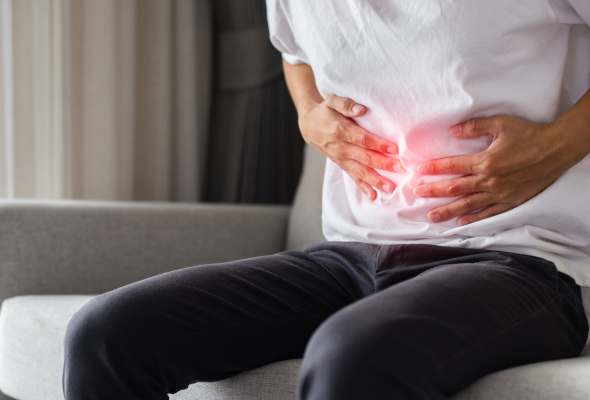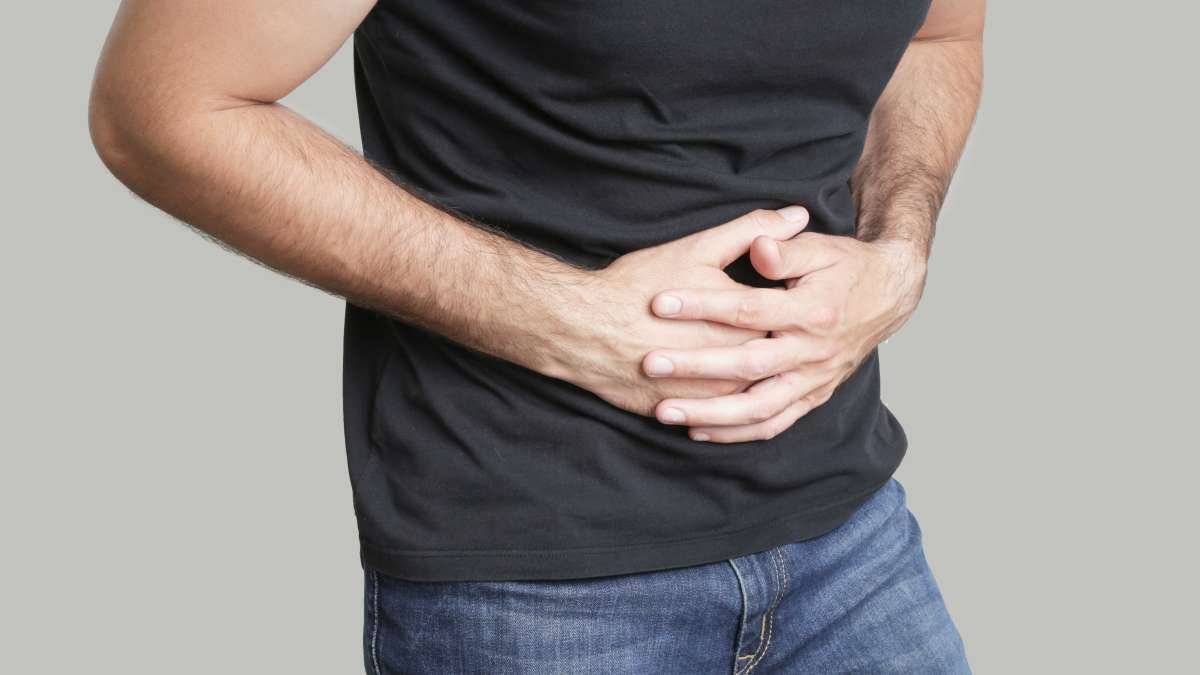An enlarged stomach is more than just feeling overweight; it can also hurt, cause gas (flatulence or burping), and make your stomach gurgle. One in three people has mild to severe bloating (meteorism). The good news is, there are ways to stop bloating.
For some, bloating is a one-time occurrence that goes away quickly, but for others, it may be a constant struggle. Finding the source of your bloating is the first step toward treating it. However, even if you haven’t seen the cause, there are proactive measures you can take to prevent bloating from occurring.
How To Stop Bloating

1. Adopt a Balanced Diet
One of the most straightforward ways to stop bloating is through a balanced diet. Certain foods are notorious for causing gas and bloating, such as beans, lentils, broccoli, cabbage, onions, and carbonated drinks. These foods contain complex carbohydrates and fibers that are not fully digested in the small intestine, leading to fermentation by bacteria in the colon, which produces gas. To minimize bloating, it is important to:
Reduce intake of gas-producing foods: Instead of eliminating these nutritious foods, consider portion control and cooking methods that reduce their gas-producing potential. For example, soaking beans overnight before cooking can reduce their oligosaccharide content, which is responsible for gas production.
Increase intake of low-FODMAP foods: FODMAPs (fermentable oligosaccharides, disaccharides, monosaccharides, and polyols) are short-chain carbohydrates that are poorly absorbed in the gut. High-FODMAP foods can cause bloating in people with irritable bowel syndrome (IBS) and other digestive issues. Low-FODMAP foods like bananas, berries, cucumbers, and carrots are less likely to cause bloating.
Incorporate probiotics: Probiotics are beneficial bacteria that can help maintain a healthy gut flora, reducing the likelihood of bloating. Yogurt, kefir, sauerkraut, and kimchi are excellent sources of probiotics that can aid digestion.
2. Practice Mindful Eating
How we eat is just as important as what we eat when preventing bloating. Eating too quickly or consuming large meals can overwhelm the digestive system, leading to bloating. Mindful eating encourages individuals to slow down and be present during meals, which can improve digestion and reduce the risk of bloating.
Chew thoroughly: Proper chewing breaks down food into smaller particles, making it easier for the digestive system to process. This reduces the amount of air swallowed, which can contribute to bloating.
Eat smaller, more frequent meals: Instead of eating three large meals daily, consider eating five to six smaller meals. This approach can prevent the digestive system from becoming overwhelmed and reduce the risk of bloating.
Avoid talking while eating: Talking while eating can cause you to swallow air, leading to bloating. Focus on the meal at hand and save conversations for after eating.
3. Stay Hydrated
Water plays a crucial role in digestion, and staying hydrated is an answer to how to get rid of bloating. Dehydration can lead to constipation, which is a common cause of bloating. Drinking enough water helps keep the digestive system moving smoothly and prevents the buildup of gas in the intestines. It is one of the vital ways to stop bloating.
Drink water throughout the day: Aim for at least 8 glasses of water daily. This helps maintain the balance of fluids in the body and supports efficient digestion.
Avoid excessive consumption of carbonated drinks: These drinks contain carbon dioxide, which can lead to gas buildup and bloating. Opt for still water or herbal teas instead.
Consider herbal teas: Peppermint tea, ginger tea, and chamomile tea are known for their digestive benefits. These teas can help relax the digestive system and reduce bloating.
4. Exercise Regularly
Physical activity is an excellent way to promote healthy digestion and prevent bloating. Exercise helps stimulate the muscles in the digestive tract, encouraging the passage of gas and stool, which can relieve bloating.
Incorporate regular physical activity: Aim for at least 30 minutes of moderate exercise most days of the week. Activities like walking, jogging, swimming, and cycling are great for maintaining digestive health.
Try yoga: Certain yoga poses, such as the wind-relieving pose (Pawanmuktasana) and the child’s pose (Balasana), can help release trapped gas and alleviate bloating.
Engage in post-meal walks: A short walk after meals can help stimulate digestion and prevent bloating. It encourages the movement of food through the digestive tract, reducing the likelihood of gas buildup.
5. Manage Stress
Stress is a significant contributor to digestive issues, including bloating. The gut and brain are closely connected, and stress can lead to changes in gut function, such as increased sensitivity and altered motility, both of which can cause bloating. But there are ways to stop bloating caused by stress.
Practice stress-relief techniques: Activities like meditation, deep breathing exercises, and mindfulness can help reduce stress levels and promote better digestion.
Prioritize self-care: Engaging in activities that bring joy and relaxation, such as reading, listening to music, or spending time in nature, can help manage stress and prevent bloating.
Consider professional help: If stress or anxiety is severely impacting your digestive health, consider seeking support from a therapist or counselor who can help you develop coping strategies.
6. Monitor Food Intolerances
Food intolerance can lead to bloating and other digestive symptoms. Lactose intolerance and gluten sensitivity are two common culprits. Identifying and eliminating trigger foods from your diet can significantly reduce bloating.
Lactose intolerance: Lactose is a sugar found in dairy products. Individuals with lactose intolerance lack the enzyme lactase, which is needed to break down lactose. This could lead to gas, bloating, and diarrhea. Switching to lactose-free dairy products or plant-based alternatives like almond or soy milk can help.
Gluten sensitivity: Gluten is a protein found in wheat, barley, and rye. Some individuals are sensitive to gluten, leading to bloating, gas, and other digestive issues. A gluten-free diet, which eliminates these grains, can alleviate symptoms.
Keep a food diary: Tracking your food intake and symptoms can help identify patterns and pinpoint specific foods that cause bloating.
7. Incorporate Digestive Enzymes
Digestive enzymes are essential for breaking down the food we eat into nutrients that can be absorbed by the body. When the body lacks sufficient digestive enzymes, it can lead to improper digestion, resulting in bloating and gas.
Consider enzyme supplements: Over-the-counter digestive enzyme supplements can help break down specific components of food, such as lactose, fats, and proteins, reducing the risk of bloating.
Include enzyme-rich foods: Pineapple and papaya are natural sources of digestive enzymes like bromelain and papain, which can aid digestion and prevent bloating.
8. Avoid Artificial Sweeteners
Artificial sweeteners, such as sorbitol, mannitol, and xylitol, are commonly found in sugar-free products like gum, candy, and diet beverages. These sweeteners can cause digestive issues, including bloating, because they are not fully absorbed in the digestive tract and can ferment in the colon.
Limit intake of sugar-free products: Check food labels for the presence of artificial sweeteners and consider reducing your consumption of products that contain them.
Opt for natural sweeteners: If you need to sweeten your food or beverages, consider using natural alternatives like honey, maple syrup, or stevia, which are less likely to cause bloating.
9. Address Underlying Medical Conditions
Persistent bloating may be a sign of an underlying medical condition, such as irritable bowel syndrome (IBS), celiac disease, or small intestinal bacterial overgrowth (SIBO). Addressing these conditions is crucial for long-term relief from bloating.
Consult a healthcare provider: If you experience chronic bloating, it is important to seek medical advice. A healthcare provider can perform tests to diagnose any underlying conditions and recommend appropriate treatments.
Follow prescribed treatments: If diagnosed with a condition like IBS or celiac disease, following the prescribed treatment plan, including dietary modifications and medications, can help manage symptoms and reduce bloating.
Consider probiotics and prebiotics: Probiotics can help balance gut bacteria, while prebiotics (found in foods like garlic, onions, and bananas) feed the good bacteria in your gut. Together, they can promote a healthy digestive system and reduce bloating.
Causes Of Bloating
Regardless of ways to stop bloating, when gas or air enters your gastrointestinal (GI) system, bloating occurs. The following are the most frequent causes:
- Menstruation and hormonal fluctuations may lead to fluid retention.
- Food intolerances or sensitivities may occur when your digestive system has trouble breaking down food.
- digestive diseases, such as Crohn’s disease, irritable bowel syndrome (IBS), or gastroesophageal reflux disease (GERD).
- lifestyle choices, such as eating rapidly, using straws, or chewing gum.
Bloating can be a frustrating and uncomfortable issue, but it is often manageable with the right strategies. By adopting a balanced diet, practicing mindful eating, staying hydrated, exercising regularly, managing stress, monitoring food intolerances, incorporating digestive enzymes, avoiding artificial sweeteners, and addressing underlying medical conditions, you can significantly reduce the frequency and severity of bloating.
These approaches offer a comprehensive plan for preventing and managing bloating, leading to better digestive health and overall well-being.
FAQ
Q: What is meant by “hard bloated stomach”?
A: Hard, bloated stomachs are often caused by particular meals or beverages as a side effect. Sometimes a hard stomach is a sign of an underlying disease when it is accompanied by other symptoms. Usually, the hard, bulging stomach subsides when you stop eating or drinking the offending item.
Q: What fast medication cures bloating?
A: Bloating may be temporarily relieved by using some over-the-counter drugs. People often utilize Tums, Gas-X, and Pepto Bismal antacids.
Q: Can you treat a bloated stomach?
A: You might feel anything from a little uncomfortable to very painful. Although it normally fades away with time, some individuals continue to experience it. Hormone changes and digestive problems may be the cause of cyclical bloating. You should consult a doctor to find the source of your swollen stomach if it doesn’t go away.











